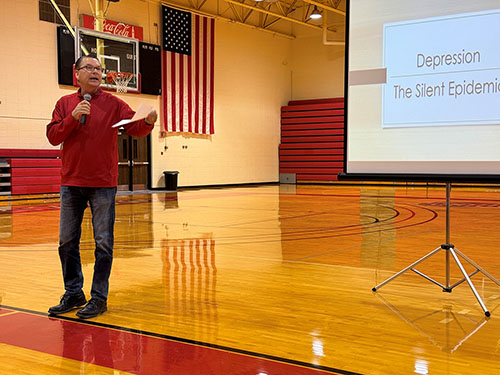NORFOLK, Neb. – Mark Potter hopes that the current generation of college students will be the generation that ends the stigma associated with talking about mental illness.
The former college basketball coach who won numerous awards while coaching in Kansas, said his generation – just like those before him -- believed that mental illness was something that was best not to be talked about.
Potter dealt with anxiety and depression that left him unable to function and unsure what was happening. He told a group of Northeast Community College students – mostly student-athletes – earlier this week that he was afraid to say anything to anyone because it would show weakness.
The people he refused to discuss it with included his wife, Nanette.
“I believed the lie,” Potter said. “I believed the stigma. I’m the head coach, the father the husband. Society says we are supposed to be strong. We’re not. We are all just broken people.”
Once the stigma with mental illness is erased, society can move forward.
“I believe wholeheartedly that your generation is the generation that will change how our world thinks about mental illness,” Potter told one side of the Cox Activities Center, which was half-full on one side.
“Let me take that one step further. I believe that your generation is the one that must think about how we think about mental illness because, unfortunately, we have not been going in the right direction.”
If nothing else, Potter wanted those attending his talk to keep in mind two points.
Strong people ask for help and the only thing wrong you can do is to do nothing, he said.
Potter said Nanette, whom he now has been married to for 39 years, knew something was wrong by his actions. He became more withdrawn, sad and uncertain of himself. But he kept it all hidden until finally she insisted on him seeing a doctor.
“Another sign for me was that I was extremely emotional,” he said.
Potter said he had suicidal thoughts because he hadn’t addressed the problems. Because he didn’t address the problem, his levels of serotonin in his brain were dropping. He lost 30 pounds in about 5 ½ weeks.
After he saw the doctor and was diagnosed with anxiety and depression, he was given some anti-depressant medication. And as the doctor told him, it would take four to six weeks for the medication to fully work, with gradual improvement.
“He (the doctor) was exactly right,” Potter said. “And he said, ‘You may get a little bit worse before you get better.’ And he was exactly right on that one.”
It was the only eight games Potter missed in his 30-year career as a head basketball coach, coaching more than 800 games.
Potter no longer coaches. He and his wife travel to speak about the importance of getting help for mental illness, having spoken in 28 states. He also spoke two years ago at Northeast.
Nanette said she taught for 32 years and didn’t know what was ailing her husband when this happened.
“I had a lot of training. I look for depression. I know all the signs,” she said, and yet she had someone with mental illness living in her house.
She urged her husband to see a doctor, but he refused. So then she got an assistant coach who is 6-foot-6 and 280 pounds who was “going to shove him in the car” before Potter relented.
Nanette went to counseling with her husband, and little by little, she saw signs he was coming back to the “Real Mark.”
“Medication and counseling didn’t make Mark somebody he’s not. Medication and counseling made Mark somebody he is,” she said.
He went on to coach 11 more years after the illness struck, and she continued to teach until they decided to quit their jobs and share their experiences. They want to be part of the solution that ends a student suicide every 10 minutes in the United States, she said.
Potter cutline
Mark Potter, who coached men’s college basketball in Kansas, discusses the importance of talking about mental illness while at Northeast Community College on Tuesday, Jan. 16. (Northeast Community College)
###

